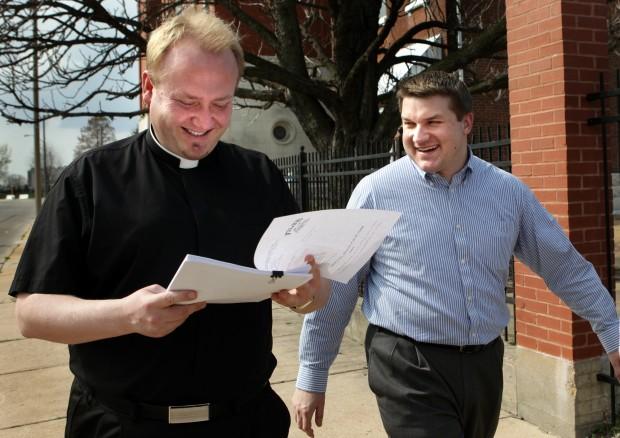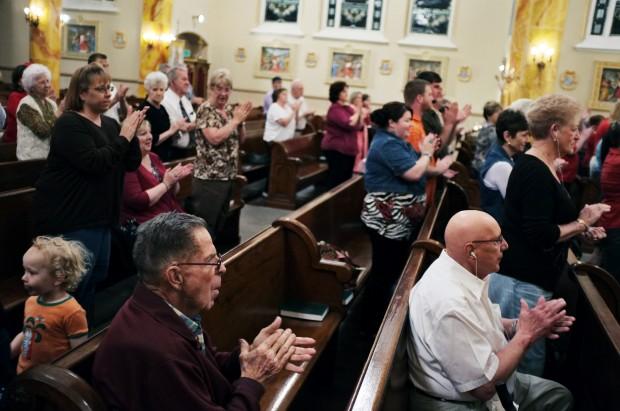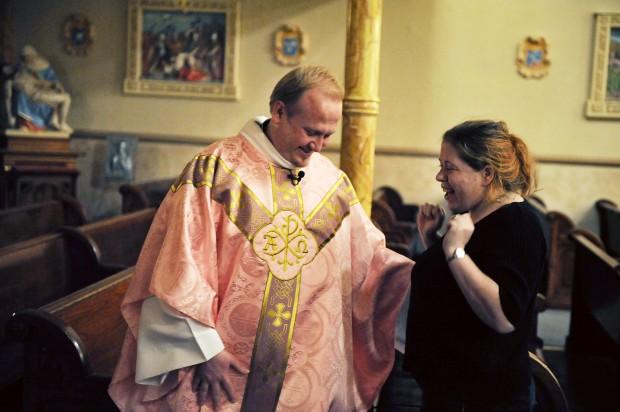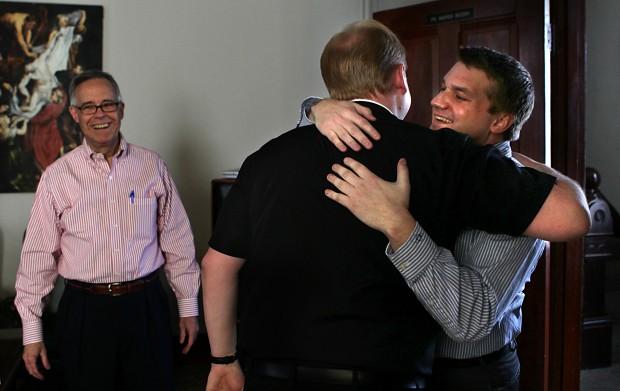St. Stanislaus ruling stirs hot debate; Carlson vows fight to Supreme Court
By Tim Townsend
Judge Bryan Hettenbach's courtroom was quiet Thursday morning as a clerk handed out copies of the judge's decision in an agonizing legal dispute between the Archdiocese of St. Louis and St. Stanislaus Kostka Catholic Church. Among the handful of lawyers present were Winston Calvert, representing St. Stanislaus, and Bernard Huger, counsel for the archdiocese. They'd been here 415 days earlier when the two-week trial ended. Now, at separate tables, they flipped to the final paragraphs of the 50-page decision. One phrase repeatedly jumped out, in count after count: "Judgment is entered in favor of Defendant Polish Roman Catholic St. Stanislaus Parish." After a minute, Calvert, expressionless, stood and approached Huger. The two men shook hands. "Looks like you won," Huger said. It was a moment achieved through months of legal strategy by St. Stanislaus. But it also came with some luck. In Hettenbach, fate gave the Polish church a judge willing to tread a thorny legal path that others more leery of church-state entanglement might have avoided. A question the judge encountered in his deliberations was an obvious one in a church dispute: Given the First Amendment's guarantee that religion would be free of government interference, should a civil court be able to decide internal church matters? Hettenbach was careful to point out in his ruling that civil courts have no business wading into theological or ecclesiastical issues, or interpreting church law. But he also acknowledged that the case brought by the archdiocese had given him no choice but to grapple with the laws of the Catholic Church — known as canon law. St. Stanislaus' lawyers believe Hettenbach succeeded. On Thursday, Richard Scherrer, one of the church's attorneys called the judge's opinion "unassailable," and a "correct finding of law." "I don't see any way that a court of appeals is going to disturb this brilliant job by a fine jurist," Scherrer said as he stood outside St. Stanislaus. The ruling upholds St. Stanislaus' ownership of its property and its right to craft bylaws that limit the authority of the Roman Catholic Church over its governance. The ruling comes just two months after a landmark U.S. Supreme Court decision held that religious employees of a church cannot sue for employment discrimination. That unanimous ruling, known as Hosanna-Tabor, was one of the high court's most important church-state decisions in decades and amounted to a huge victory for religious institutions. The archdiocese saw in Hettenbach's willingness to explicate canon law an encroachment by the government on religious freedom that the Hosanna-Tabor decision halted. In a statement Thursday, St. Louis Archbishop Robert Carlson promised to appeal the judge's opinion "all the way to the Supreme Court." HISTORICAL ORIGINS Hettenbach relied on so-called "neutral principles of law," secular documents like deeds, constitutions and bylaws that govern individual churches as organizations. In using the neutral principles approach, Hettenbach rejected another older approach in which civil courts largely deferred to the internal legal mechanisms of a church. In crafting his decision, Hettenbach had to dig back to the historical origins of St. Stanislaus. In 1891, the members of St. Stanislaus formed a corporation under Missouri law in order to secure a loan for a new church building. The civil corporation, called Polish Roman Catholic St. Stanislaus Parish, existed alongside the parish itself. The lay board overseeing the corporation would be allowed to control the property and assets while the archbishop would appoint the board members and pastor. The corporation's original articles of agreement, signed by the pastor and five parishioners, said the "purpose" of the corporation was, in part, "to maintain a Polish Roman Catholic Church." Perhaps more than on any one point, Hettenbach's decision would rest on his interpretation of whether St. Stanislaus has remained true to that purpose. Specifically, the judge needed to decide if the church's original mission had been undermined by recent revisions to its bylaws. Those changes stemmed largely from a request in 2003 by then-Archbishop Justin Rigali that the church undergo a legal restructuring. When Rigali sent a vicar general to carry that message, his methods served only to deepen the church resolve to be independent. The next year, the board rewrote its bylaws eliminating the archbishop's authority. (The bylaws had also been rewritten, to less dramatic effect, in 2001.) Then Archbishop Raymond Burke responded by pulling the parish pastors, declaring several board members excommunicated and announcing that the church was no longer Roman Catholic. Ignoring the archbishop's authority, the board hired its own pastor, who was, in turn, suspended, declared excommunicated and eventually defrocked. In the archdiocese's view, St. Stanislaus was no longer a Catholic church. And that position was central to its argument before Hettenbach. Using the neutral principles of law approach they argued that St. Stanislaus corporation had cast away the church's Catholic status, ignoring Vatican directives, and had broken its original agreement to "maintain a Polish Roman Catholic Church." Or as Archbishop Robert Carlson said in a press conference after the ruling, the corporation had "transformed St. Stanislaus into an entity which has no resemblance to a Roman Catholic parish." But Hettenbach interpreted things differently. STUDYING '01, '04 BYLAWS Hettenbach's approach was to simply look at the 2001 and 2004 bylaw changes made by the corporation board, and decide if those changes were in conflict with the original articles of agreement. In his ruling, the judge proceeded methodically through each bylaw change that the archdiocese argued violated canon law. If those bylaw changes didn't "expressly contradict the 'purpose' of maintaining a Roman Catholic Church," Hettenbach determined it was not in conflict with the corporation's originating documents. But he steered clear of determining whether St. Stanislaus has actually fulfilled its chartered mission of maintaining a Catholic church to the satisfaction of higher church authorities. To do so, he said, would inappropriately insert the court into church disputes over which it has no jurisdiction. "Whether or not Defendants are adhering to the standards required by the Catholic Church is clearly a theological controversy," the judge wrote. But Carlson and other critics say the judge tried to have it both ways. Even as he used St. Stanislaus' foundational documents to guide his decision, he failed to respect how those documents have been interpreted by church authorities, including the Vatican. In the end, Carlson said, Hettenbach "has substituted his own analysis of church law." Douglas Laycock, a law professor at the University of Virginia who successfully argued the Hosanna-Tabor decision, agrees, saying the ruling potentially turns on its head the relationship between individual Catholic churches and the hierarchy that oversees them. "Now you have a judge saying this was an independent congregational Catholic church, and every Catholic in America knows that must be wrong," he said. PUTTING CHURCH ON NOTICE But Frank Ravitch, law professor at Michigan State University, said Hettenbach's ruling "might be the unique, rare case" that shows that even in the face of voluminous canon law, an individual church may have sufficient legal documentation to exert its independence. And that should put centralized religious organizations like the Catholic church on notice. "If you're a hierarchical church, make sure your titles are clear," Ravitch said. Despite its many attempts, the Archdiocese of St. Louis failed to do that to the judge's satisfaction. Or, as Hettenbach wrote — straddling the line between the divine and the earthly — "The Archbishop may own the souls of the wayward St. Stanislaus parishioners, but the St. Stanislaus Parish Corporation owns its own property." Contact: ttownsend@post-dispatch.com
|
.
Any original material on these pages is copyright © BishopAccountability.org 2004. Reproduce freely with attribution.



